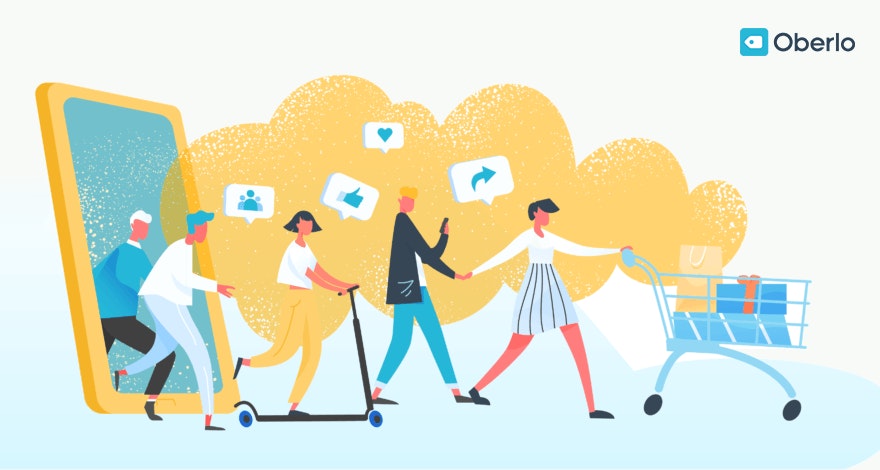Social media marketing is more important than ever before. Today billions of people use social media, and that number is growing every day.
You’re probably already engaged in some form of social media marketing, but in order to stand out from your competitors in a crowded market, you’ll need to become a social media marketing master.
Thankfully, conquering social media marketing is a lot easier than it used to be. If you’re already doing some marketing on social media platforms, you’ll be able to easily go from 0 to 60. And if you’re brand new to it, you’ll be surprised at how quickly you can pick up the basics and then go beyond them.
Becoming a social media marketing maven requires a thorough understanding of the most popular social media sites. You need to understand not only how they operate but also how people use them.
This might sound like a tall order, but we’ve broken it up in a way that’s super easy to understand.
In this guide, you’ll learn exactly how social media marketing works today and a tactical guide to social media marketing on five of the biggest platforms — Facebook, Instagram, Twitter, Snapchat, and Pinterest.
Then, we’ll look at a step-by-step method for creating an effective social media marketing plan. You’ll learn which social media metrics you should track, how to measure the effectiveness of your campaigns, how to increase social media engagement, and much more.
When you’re done, you’ll be able to approach social media marketing with confidence and build an engaging social media presence that people will love. You’ll also learn some insider social media tips that will enhance your performance on every platform.
Ready? Let’s get started!
Post Contents
- An Introduction to Social Media Marketing
- The Growing Importance of Social Media Marketing
- The Impact of Social Media Marketing
- The Benefits of Social Media Marketing
- Choosing the Right Social Media Network
- Using Facebook for Social Media Marketing
- Conclusion: Facebook Marketing
- Using Instagram for Social Media Marketing
- Using Twitter for Social Media Marketing
- Twitter Ads
- How to Increase Twitter Followers
- Using Pinterest for Social Media Marketing
- How to Create a Social Media Marketing Plan
- Conclusion



An Introduction to Social Media Marketing
The term “social media marketing” is pretty broad. It covers any type of marketing strategy that uses social media sites to advertise and sell products, build customer rapport, and create brand awareness.
In terms of a social media definition, think of a social media platform as any site that focuses on social, interpersonal interactions.
→ Click Here to Launch Your Online Business with Shopify
For the purposes of this guide, we’ll be focusing on four types of social media marketing: social media advertising, video marketing, user-generated content (UGC) marketing, and influencer marketing.
Ever since the first social media sites rose to popularity, marketers have realized just how effective social media marketing can be. It allows you to reach people on platforms they use every day, and it feels a lot more natural than many traditional forms of advertising.
In the last couple of decades, marketers have turned social media marketing into a fine-tuned science. As a result, it’s become more commonplace for virtually all businesses. Even small mom-and-pop shops are using social media marketing these days.
While social media marketing may have begun as a trend, today it’s anything but. In fact, it’s one of the most important forms of marketing, period.
The Growing Importance of Social Media Marketing
Social media wasn’t always the colossus it is today. But over the years, as more and more people have made it a priority, social media has become a necessary contact point for marketers.
People are spending lots of time on social media, and that amount is steadily growing. According to the latest social media statistics, a typical social media user will, on average, spend roughly two hours on social media every day.
This means that marketers have huge windows of time to reach their customers. Social media has become more than a place where people hang out; it’s become an activity in its own right. This is especially true for younger generations––millennials and Generation Z make up the majority of social network users.
With traditional marketing methods becoming less common (and less effective), social media has become increasingly vital to the marketing landscape.
As social media has matured, companies spend a significantly larger amount of their marketing budget on social media marketing than in prior years. This higher spend corresponds to a lower amount of expenditure on other forms of marketing.
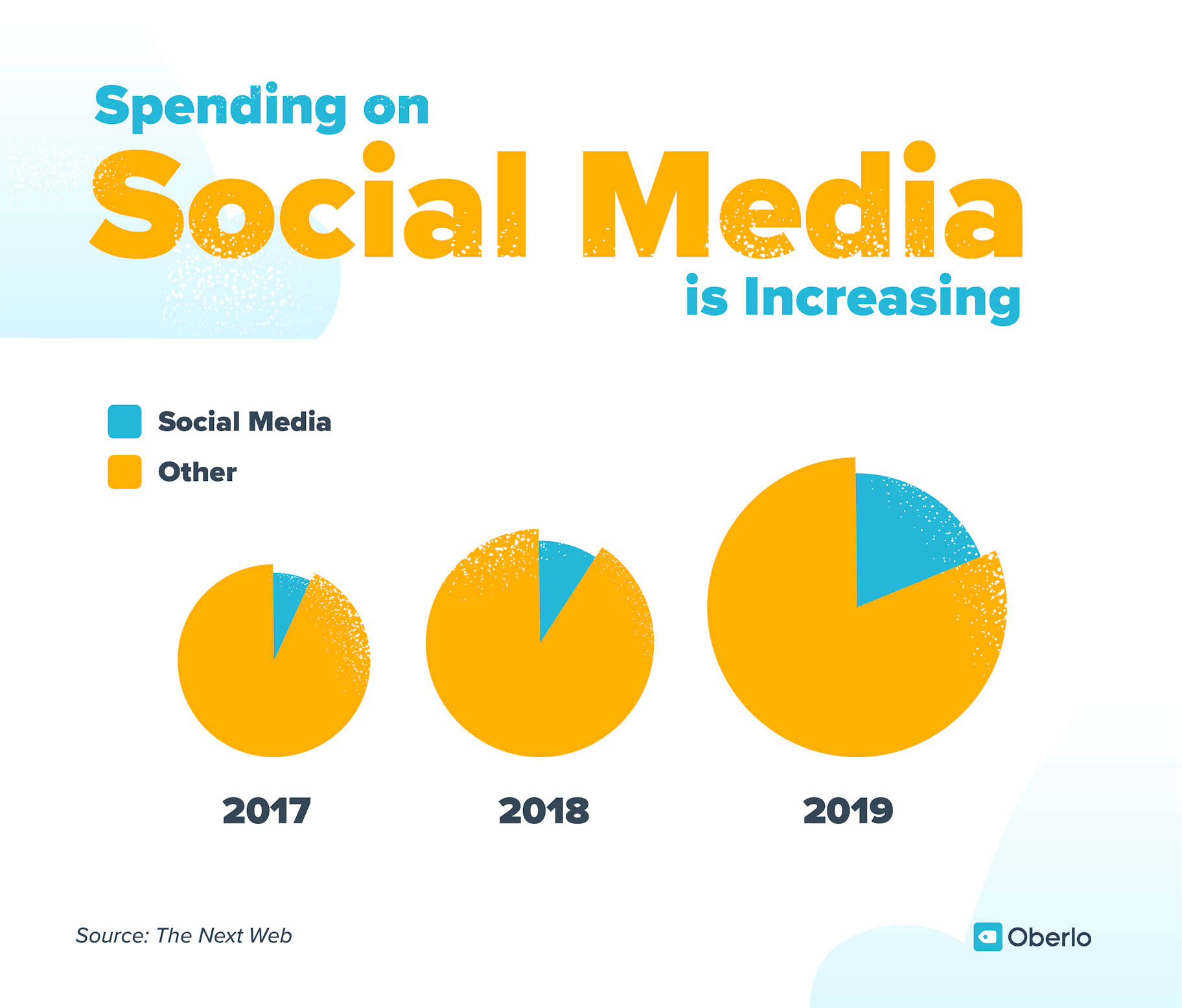
Going forward, social media marketing will be even more important. As new social media networks appear, marketers will need to become social media experts in order to master each new platform that becomes the next big thing.
The Impact of Social Media Marketing
Social media marketing can be immensely powerful. Because of its virtually unmatched ability to reach customers in an organic way, social media marketing has become a critical element of many businesses’ marketing approaches.
There are plenty of Facebook stats that show off just how impactful the platform is. According to Buffer’s 2019 State of Social report, 73% of marketers say that social media marketing has been “very effective” or “somewhat effective” for their company. And 58.8% say social media marketing is “very important” to their overall marketing strategy.
Of course, social media marketing doesn’t just have an impact on businesses’ bottom lines. It also has a hugely positive impact on customers. 71% of customers who have positive experiences with a brand on social media are likely to recommend that brand.
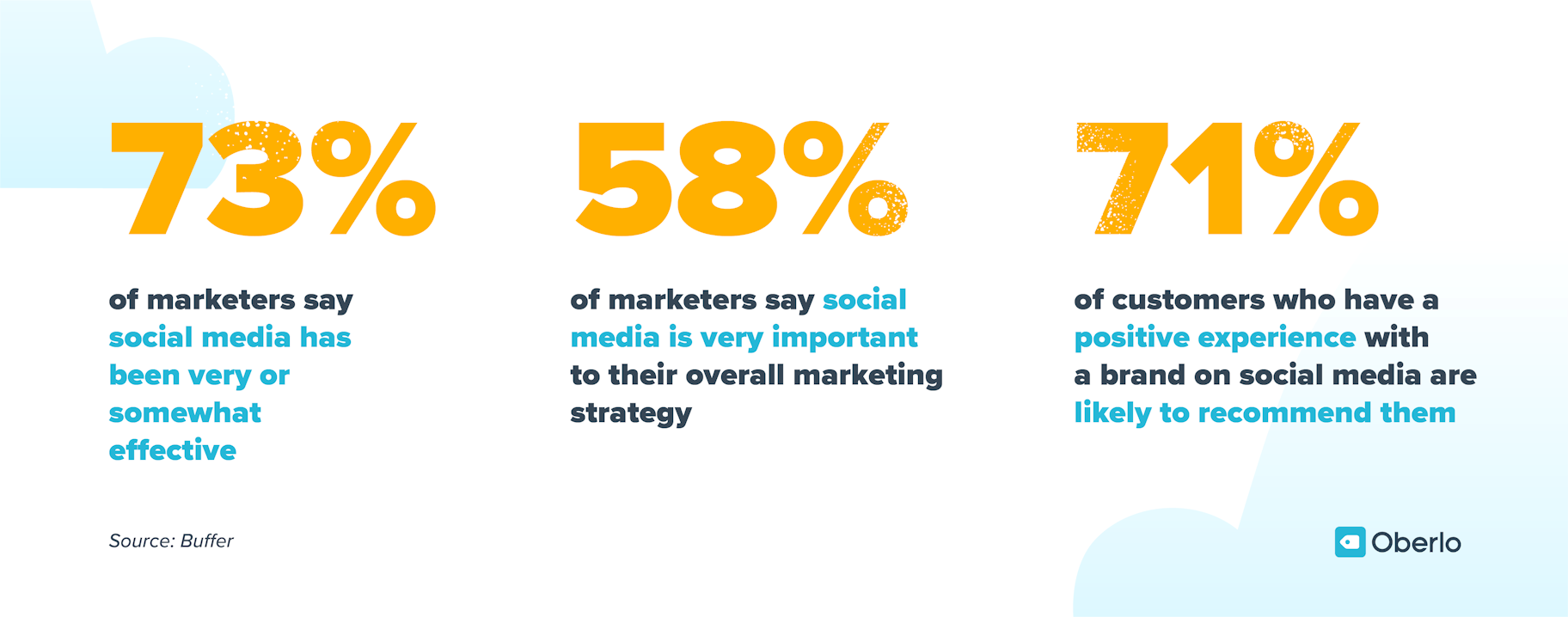
Social media is the perfect place for brands to build relationships with both existing and potential customers. It’s become almost an assumption that the average person uses one or more social media networks. Social media is a large part of our culture today, and it’s getting bigger by the day.
The Benefits of Social Media Marketing
If you’re not already focusing on social media marketing, you’re probably wondering exactly what it can do for your business.
The benefits of social media marketing range from the obvious to the unexpected. Here’s a breakdown:
1. Increase sales.
Above all else, social media marketing will help you boost your sales, and it can happen quite easily.
People respond very well to social media marketing because it’s organic and interactive. What does that mean for your bottom line? More customer engagement, more conversions, and more sales.
And of course, this also works very well in the long term. In one survey, over 50% of businesses who used social media marketing for two years reported improved sales.
2. Build brand awareness.
Since so many people interact with social media, you’ll be able to put your products in front of a huge audience that you might not otherwise have access to.
Many brands, like Dollar Shave Club and Glossier, have blown up because of their social media presence. If it weren’t for their effective approaches to social media, they likely wouldn’t be the multi-million dollar success stories they are today.
Check out Dollar Shave Club’s 2012 viral video that helped to catapult them into the mainstream:
And Glossier has developed one of the most remarkable approaches to Instagram marketing we’ve ever seen, using the platform to grow a devoted following.

3. Develop relationships.
Social media is also perfect for cultivating relationships with customers. Remember, 71% of customers who have positive experiences with a brand on social media will likely recommend the brand to others. By interacting with people on posts and in comment sections and direct messages, you can create positive rapport and build relationships with people who will hopefully turn into customers.
Choosing the Right Social Media Network
So how do you know which social media networks you should be using? Not every social media site is right for every business, so this requires a case-by-case approach.
In this guide, we’re taking a look at five of the most used channels for social media marketing. Chances are you’re already on most of these platforms, if not all of them. Each social media network has its own unique learning curve, so read on to learn crucial social media tips about each site.
Using Facebook for Social Media Marketing
Facebook is currently the largest social media network, with over 2 billion users and counting. This makes it a massively effective platform for social media marketing.
When Hootsuite surveyed businesses for their 2018 Social Media Barometer Report, they found that 98% of the businesses used Facebook.
And many marketers are seeing excellent results––30% of businesses say that Facebook offers the highest ROI of any social media platform.
It’s clear that Facebook marketing is extremely effective. Let’s take a closer look at exactly why that is and how you can leverage the platform.
Facebook Ads
Facebook ads are often the top choice for Facebook marketers. While there are several ways to market on Facebook, ads are common because they’re simple, flexible, and impactful.
Facebook ads are great when it comes to marketing for ecommerce as well as traditional businesses. They scale very well, so whether you’re looking to get your first online sales or expand your advertising strategy, you’ll be able to modify your Facebook ads to suit your exact needs.
In fact, you can fine-tune just about any aspect of Facebook ads. Their audience targeting is an industry standard at this point. Facebook allows you to create lookalike and custom audiences so you can precisely target your demographic. If that weren’t enough, Facebook’s retargeting ability is stellar. You can choose from many ad formats and optimize each ad in just about every way imaginable (including traffic, leads, engagement, purchase objectives, and much more).
Virtually any business can benefit from Facebook ads. They’re an industry standard at this point, and there’s really no reason why you shouldn’t be using them.
It’s also a lightweight option if you’re just starting out. According to WordStream, the average cost per click with Facebook ads is $1.72, compared to $2.69 with Google AdWords.
Facebook Shopping
A nice perk of Facebook is Facebook shopping. In short, you can set up a shop right on the site itself. This is great because users don’t have to leave the site to start shopping.
A Facebook shop is a tab on your main page that allows you to promote and sell products. Here’s an example:
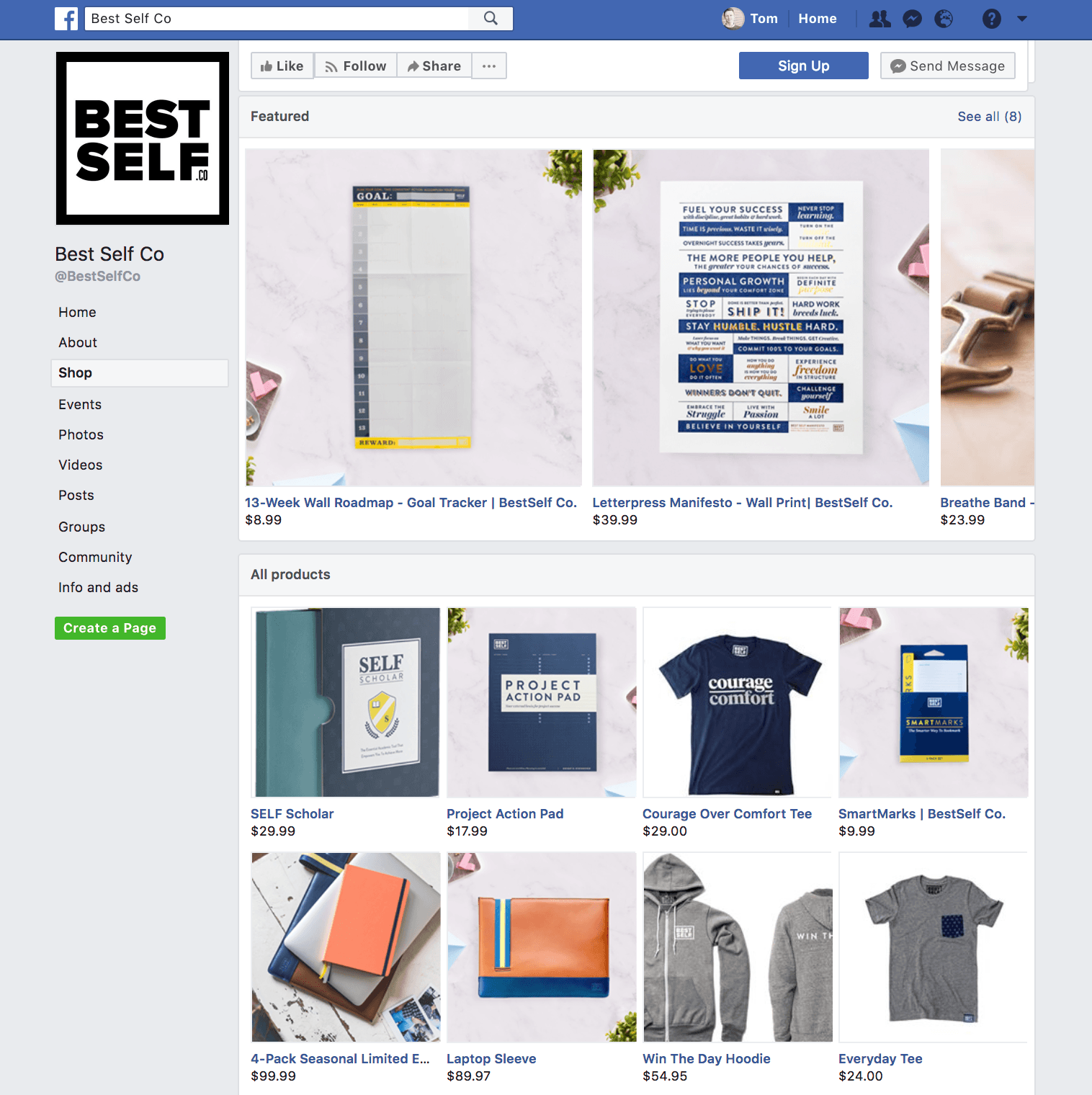
When you click on one of the products, an expanded product page pops up.
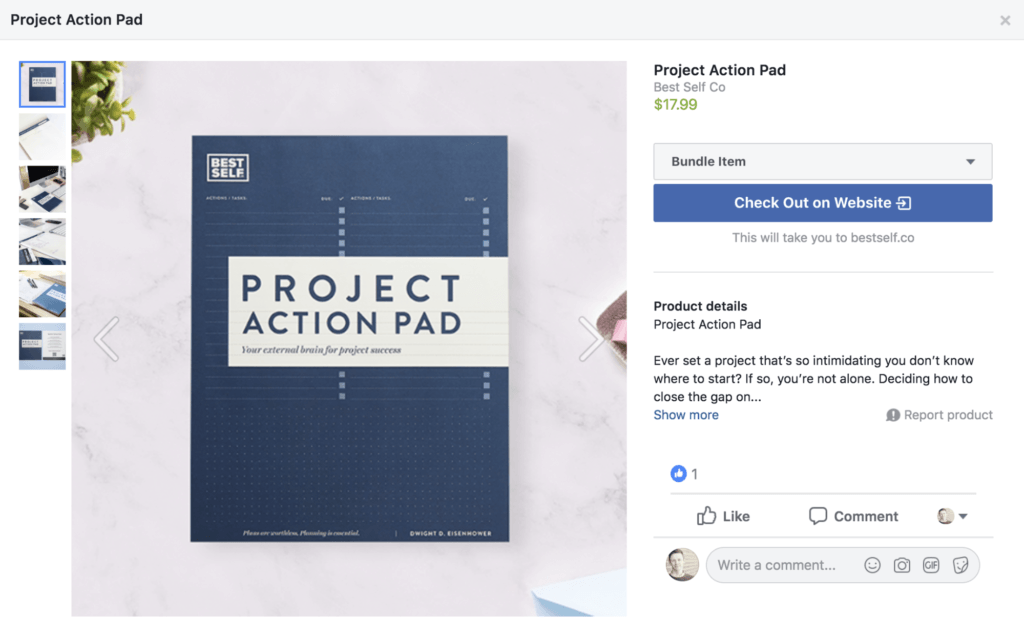
It’s basically a lightweight ecommerce interface. While it’s not going to compare to something like a Shopify store, it’s surprisingly full-featured considering it’s built into Facebook.
Facebook shops are great because they’re incredibly convenient for Facebook users, and they make the shopping process nearly seamless. You can also do quite a lot with a Facebook shop. For example, you can tag products from your shop in your posts:
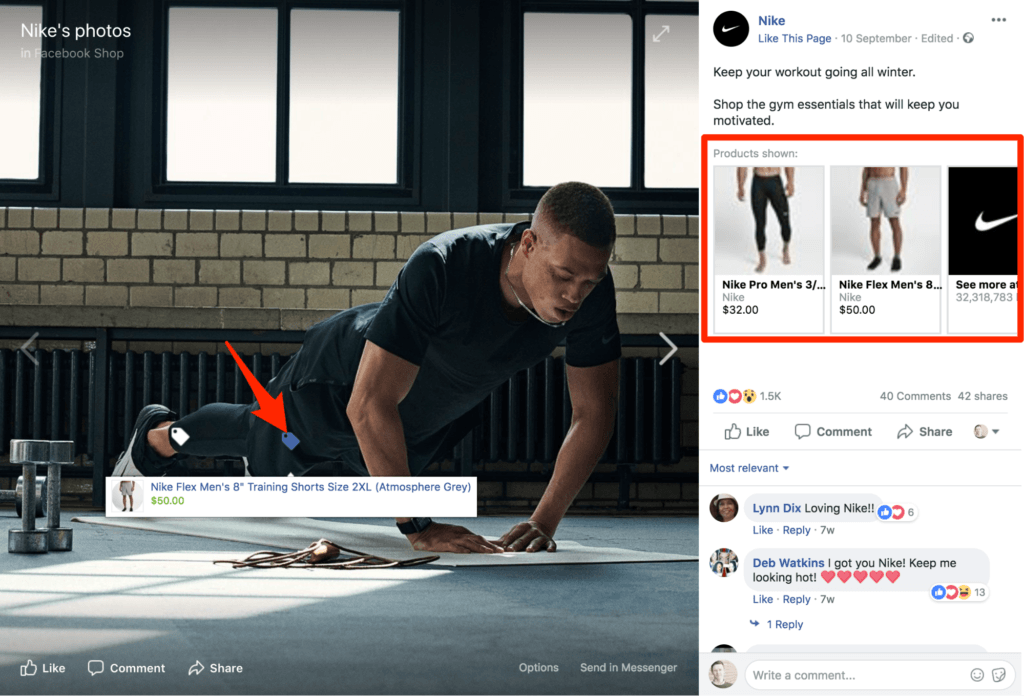
With features like these, Facebook shops are a must for any business doing Facebook marketing.
How to Increase Facebook Followers
If you’ve been on Facebook for any amount of time, you’ve probably wondered about the best ways to increase Facebook followers. Having tons of followers doesn’t guarantee runaway success, but it does increase the chances by a significant margin.
Thankfully, it’s pretty easy to gain droves of followers organically and legitimately. You can get followers through ads and other promotions, invites, content, influencer marketing, and many other methods. It’s actually hard to not get followers.
Almost anything you do on Facebook is easily shareable. This makes it easy for your existing followers to share your content with new followers, which in turn allows you to reach new audiences on a constant basis.
Whatever you do, don’t buy fake followers. Facebook is well aware of this tactic and can easily weed out fake profiles.
And besides, when there are so many ways to gain followers naturally, you don’t even need to resort to buying followers.
How to Increase Facebook Engagement
Learning how to increase social media engagement is one of the best things you can do for your social media marketing strategy. Engagement is key to building an audience and getting people interested in what you have to offer.
Typically, the best way to engage people is through content. This can take many forms, but on Facebook, one popular tactic is to make use of user-generated content (UGC). For customers, UGC is extremely trustworthy because it comes from other customers. That’s why UGC is 9.8 times more impactful than branded influencer content.
It’s a snap to source great UGC. A lot of UGC, like testimonials and reviews, will come about organically. But you can also get UGC through posts, contests, reposts, and more.
Of course, there are many other ways to increase Facebook engagement. Interacting with people in comment sections is a great method that allows people to see your positive conversations with your followers. Sharing relevant content and posting images are a couple of other winning strategies that you can utilize.
How to Understand Facebook’s Algorithm
You may have heard that there are regular Facebook algorithm changes that affect how your content and ads are displayed in users’ news feeds.
It sounds intimidating to keep up with these algorithm changes, but it’s not as bad as it seems. If you keep up with the big Facebook algorithm changes and understand what each change means, you’ll be good.
That’s because Facebook’s algorithm changes usually all have similar effects. Facebook is all about connecting people, so tends to prioritize content that encourages people to comment and interact with each other. As a business on Facebook, you’ll need to work hard to make sure your content is interesting and engaging to your audience, which encourages them to comment and share the posts.
That said, if you take advantage of all the marketing tools that Facebook has to offer, you’ll still get exposure. But should you put all of your eggs into the basket that is Facebook? Definitely not.
Using Facebook Video
Facebook video is more popular than ever before. On social media, video in general has exploded in popularity because of its unique ability to engage people.
Facebook is one of the best platforms for video mostly due to its Facebook Live feature that allows you to easily live stream video content. While Facebook can’t rival YouTube, it’s the next best platform for long video content.
Martha Stewart regularly uses Facebook Live to stream content related to her product line. In these videos, she’s often cooking, sharing tips, and taking viewers behind the scenes.
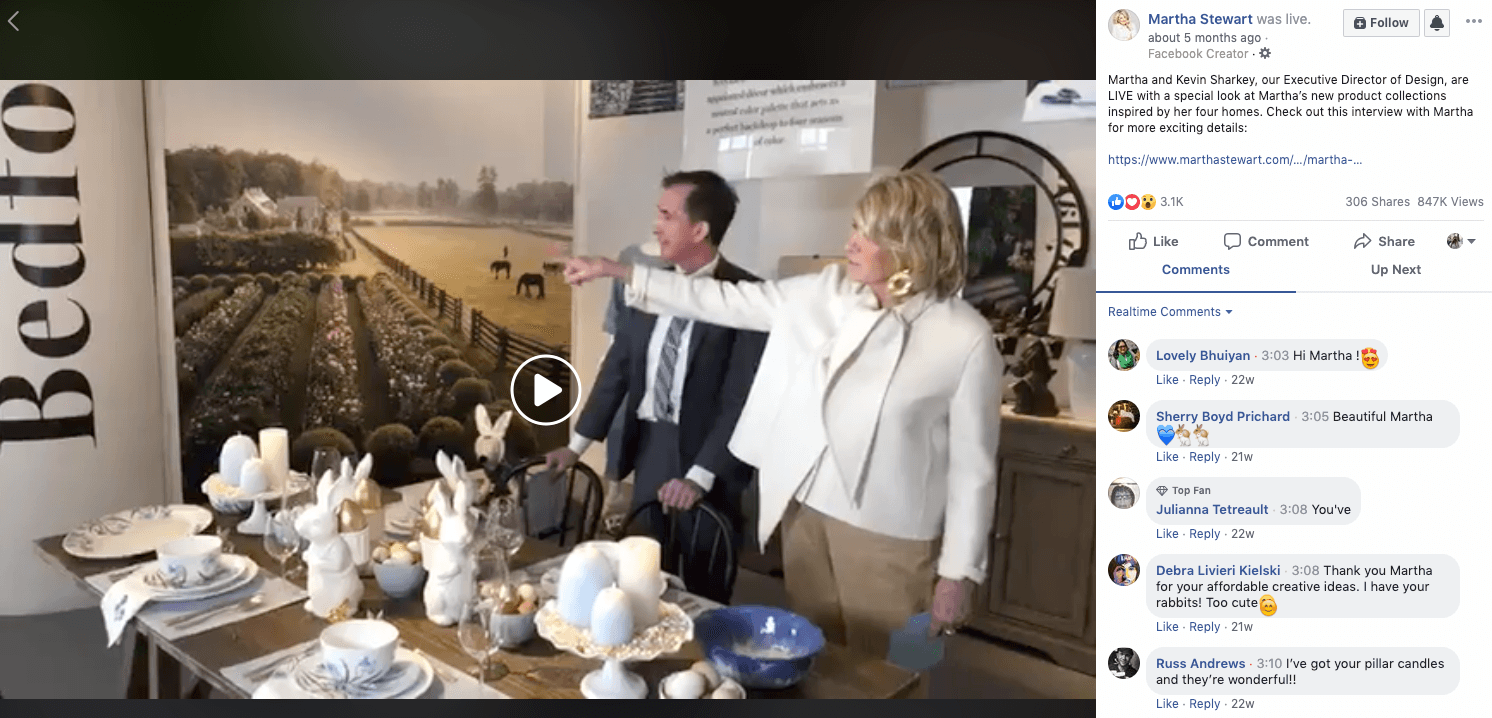
When it comes to Facebook Live video, the sky’s the limit. You can use it for product demonstrations, interviews, Q&A sessions, and so much more.
Using Influencer Marketing on Facebook
Last but not least, let’s look at Facebook influencer marketing.
While Instagram has definitely become the influencer platform of choice, Facebook is still a great option. After all, it’s still the biggest social media platform.
Thanks to Facebook’s easy sharing capabilities, it’s easy to share influencer content on your own page. This is what Almond Breeze did when they collaborated with influencer Lisa Lillien, also known as Hungry Girl.
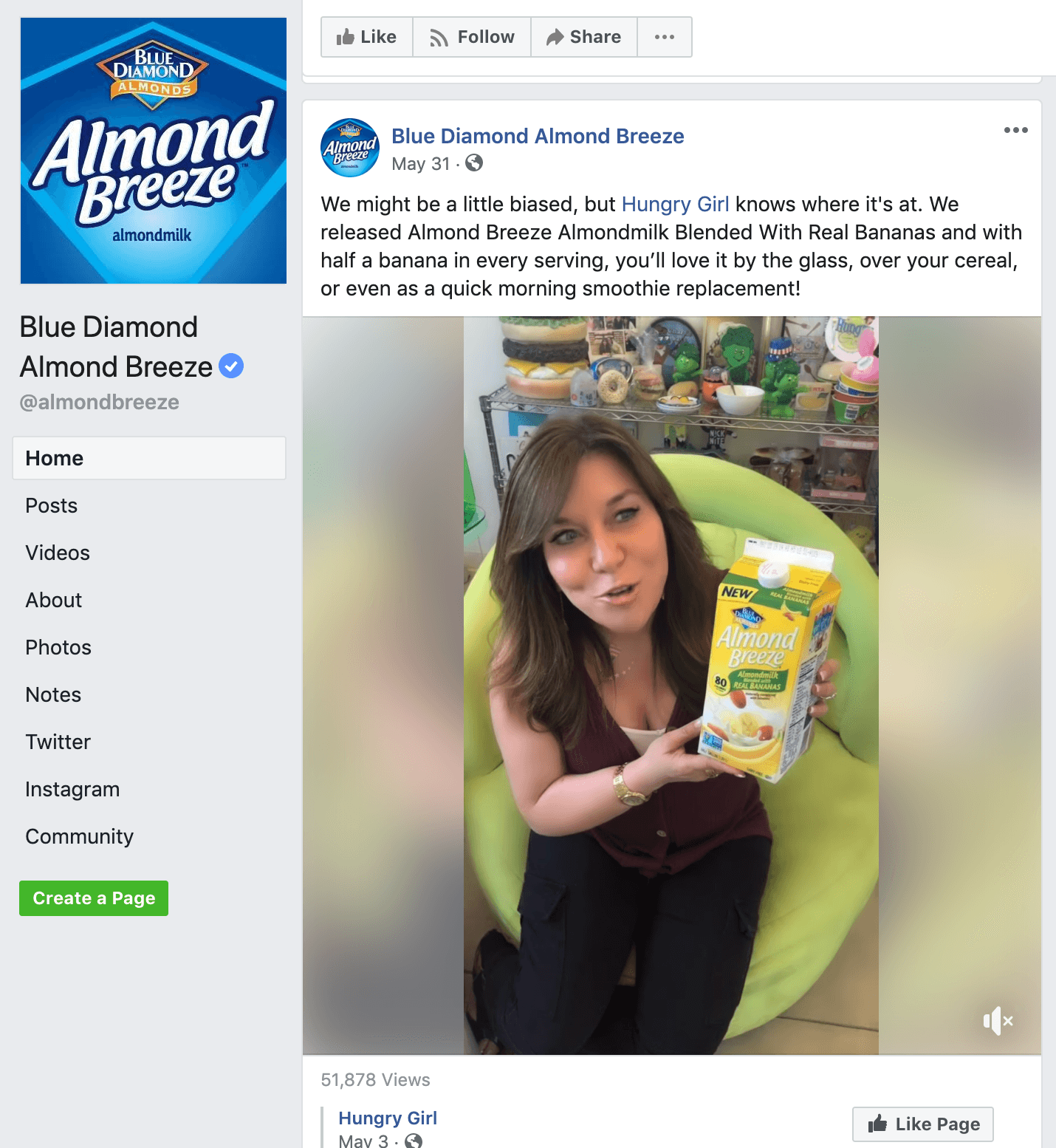
This feature is especially useful because you can add your own caption to shared content, which allows you to add some of your brand voice back into the mix. The unique perspectives that influencers bring are invaluable, but at the same time, if you can direct people’s attention in the way you want, why not take advantage of that ability?
Facebook Groups
Last but not least, Facebook Groups are becoming increasingly important. Due to Facebook’s algorithm changes, Group postings have been getting more priority, and you can leverage this fact by creating your own Groups and participating in others’ Groups.
Having a Group for your own brand is a great way to share exclusive content and connect with your audience on a personal level. This adds a nice touch to your Facebook marketing approach, and it creates another point of contact.
You can make your groups Public, Closed, or Secret. Public Groups are great for getting the word out about your brand, while Closed and Secret Groups create authority and give members a feeling of exclusivity.
You also get a Group tab on your main page. This makes it easy for people to find your Group if it’s public, and it gives members of Closed or Secret Groups an easy way to navigate to the Group.
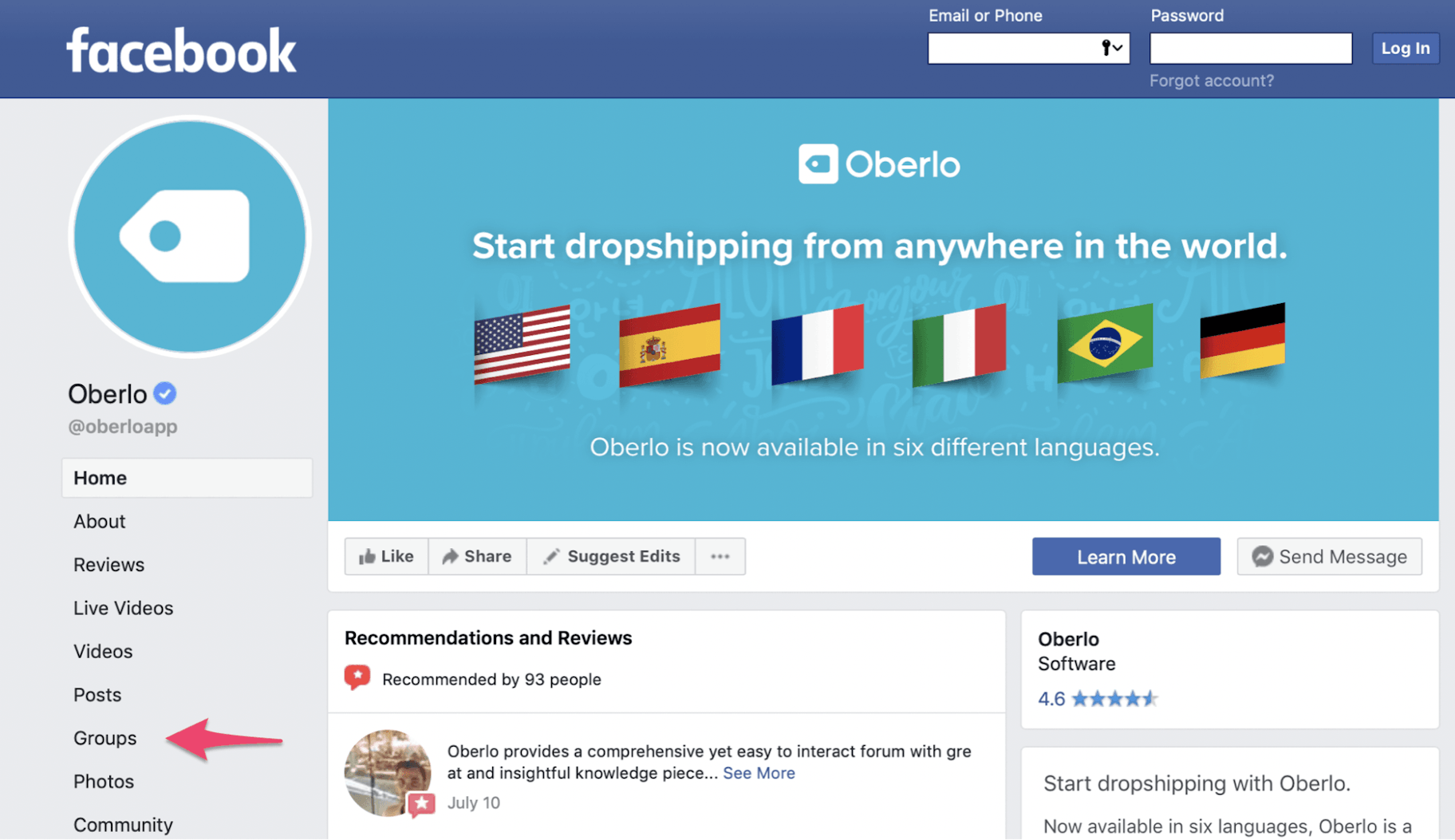
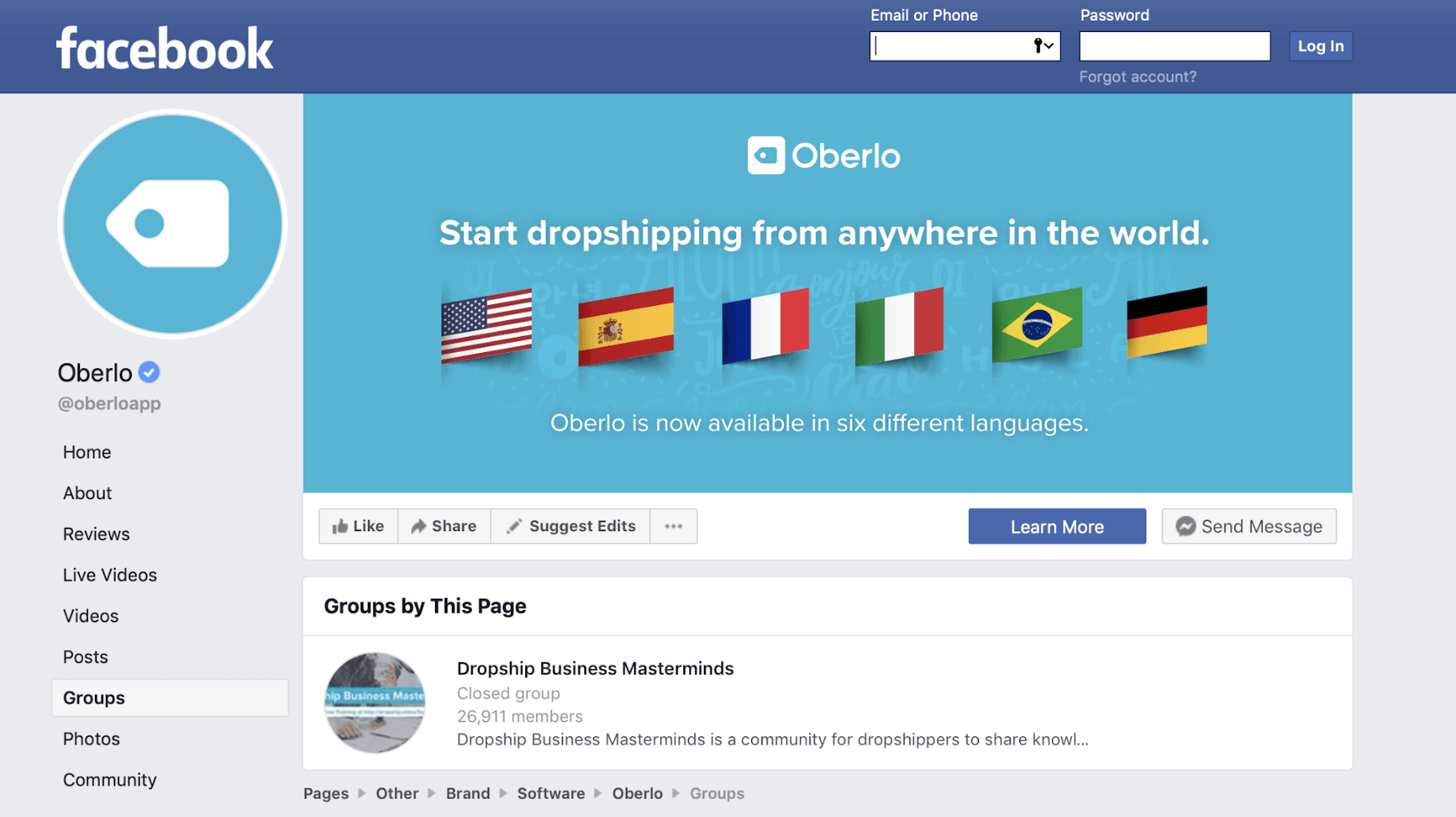
Conclusion: Facebook Marketing
Using Facebook for business is still a great way to draw attention to your brand and grow your audience. Facebook really shines when it comes to ads and live video, but there’s so much you can get from the platform.
Using Instagram for Social Media Marketing
Instagram recently hit one billion followers, making it roughly the sixth biggest social media site in the world. Even if it’s not topping the list, Instagram is incredibly relevant. It’s the platform of choice for influencer marketing, and more and more brands are using its video capabilities.
Instagram is also one of the most addictive social media networks. 55% of users aged 18 to 24 check Instagram multiple times per day. That means people spend a lot of time on Instagram.
Back in 2017, the company reported that, on average, users under the age of 25 spent 32 minutes a day on Instagram, while users 25 and older spent 24+ minutes a day on the platform. These Instagram stats only scratch the surface of how popular the platform is.
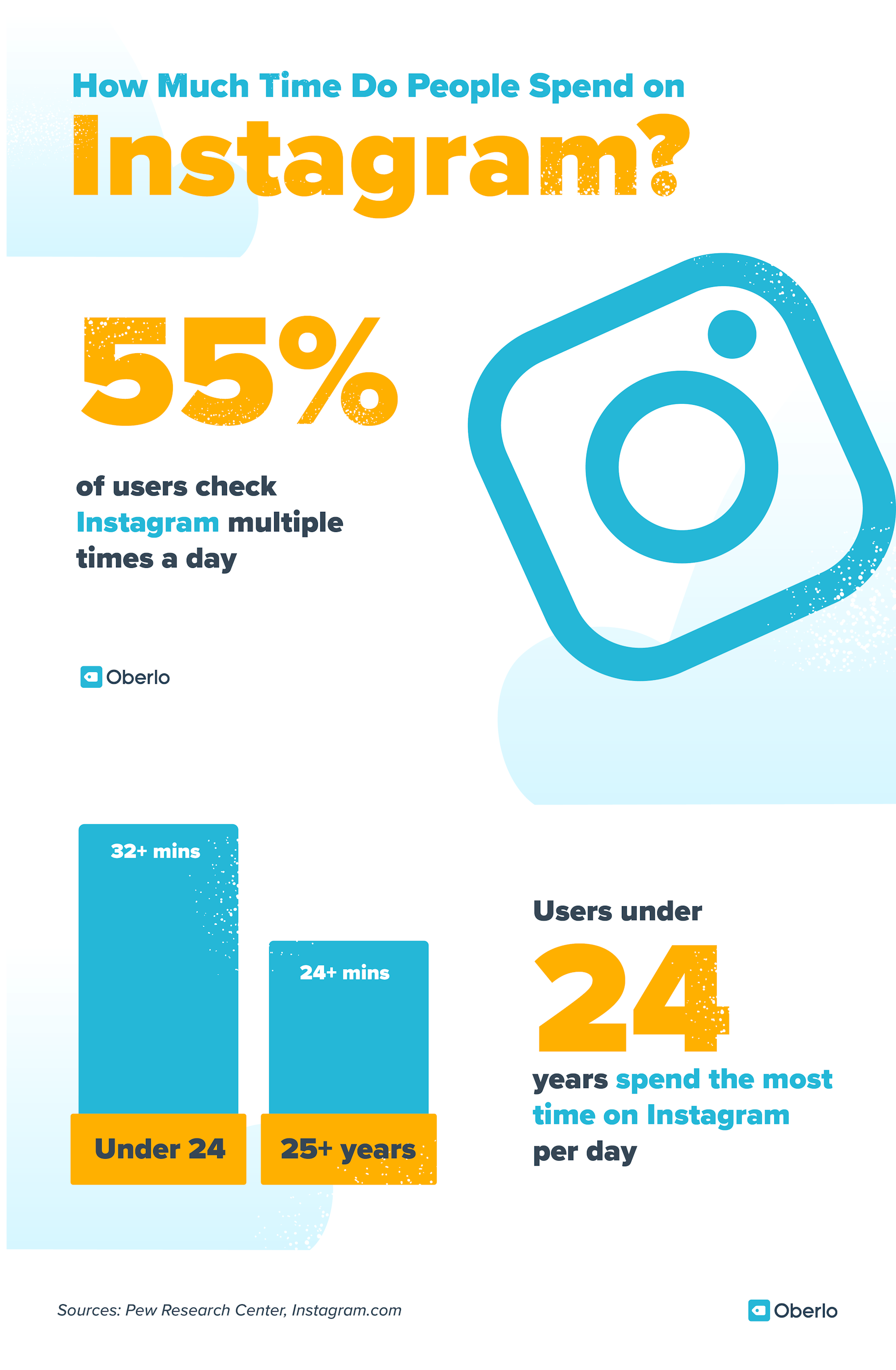
And Instagram has a lot to offer. While similar to Facebook in terms of features, Instagram is arguably much better in many aspects. If you’re not already using Instagram for business, here’s what you should be focusing on.
Instagram Ads
Instagram ads are perhaps the best ads for social media marketing. Like Facebook ads, Instagram ads are native, so you see them as you naturally scroll through your feed. And thanks to Instagram’s design and layout, it’s often hard to notice when you’re seeing an ad.
This is beneficial because it allows you to advertise while not coming off as salesy. It’s the direct opposite of those flashy banner ads that used to plague websites. Advertising on Instagram is simple, sleek, and seamless.

Instagram ads are easy to set up (especially if you have experience with Facebook ads). You can even check out your competitors’ Instagram ads to refine your approach.
A big reason to consider ads is because they have a lot of unique benefits that you can’t get with regular posts. For instance, companies have run into a link problem with Instagram because you can’t put clickable links in ordinary posts.
But with Instagram ads, you can place easy-to-click links right into your ad:
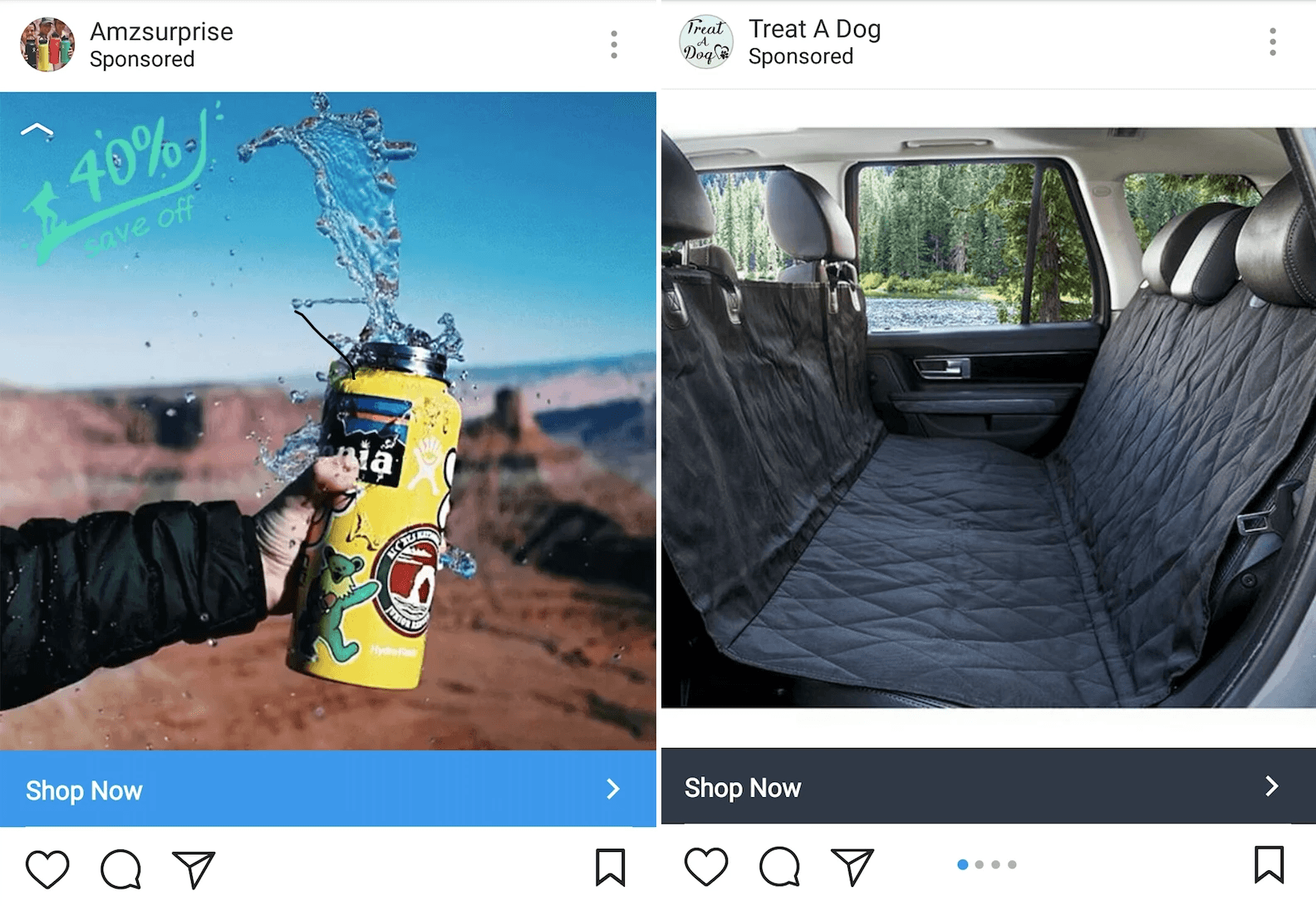
This makes the shopping process (which we’ll go into in the next section) a lot easier. Since these ads feel so organic, they tend to draw attention––and, of course, clicks.
As with Facebook, Instagram ads can easily be customized, so you can easily make changes once you know what works and what doesn’t. Since Facebook and Instagram use the same ad editor, you get all the benefits of Facebook’s ads, just on Instagram. That means laser-focused audience targeting, custom audiences, and much, much more.
Instagram Shopping
Thanks to ads and other branded content, Instagram shopping is super simple for users.
Setting up shopping on Instagram is easy if you’re using Shopify. That’s because you can connect your Shopify store and Instagram account for seamless selling.
You can promote your products in posts, Stories, and ads. Taking a multi-pronged approach is best here so you can reach the widest audience. Tagging products in your posts and advertising in Stories will help you reach your existing followers, while promoting products in ads will give you access to entirely new audiences.
Here’s an example of a post with tagged products:
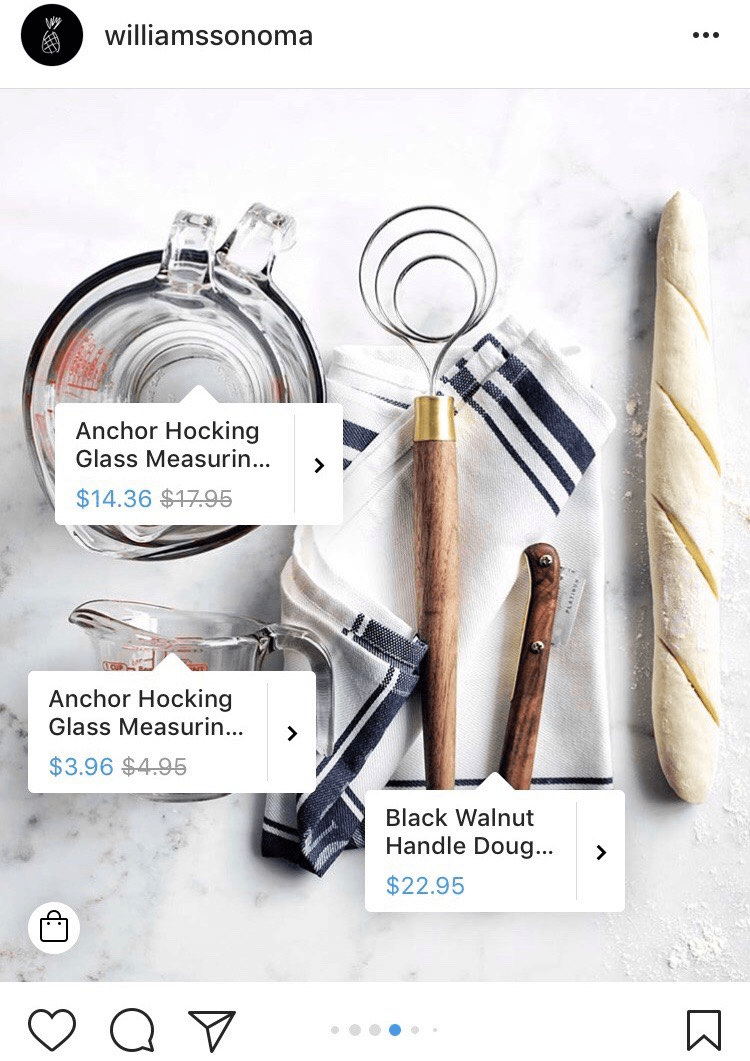
This feature is great for showcasing multiple products, and you can even create carousel posts to showcase multiple sets of products.
As you tag more products, you’ll build the Shop tab on your profile. This is a tab that appears next to your photo feed and allows users to browse all of your tagged products and navigate to your website to buy them.
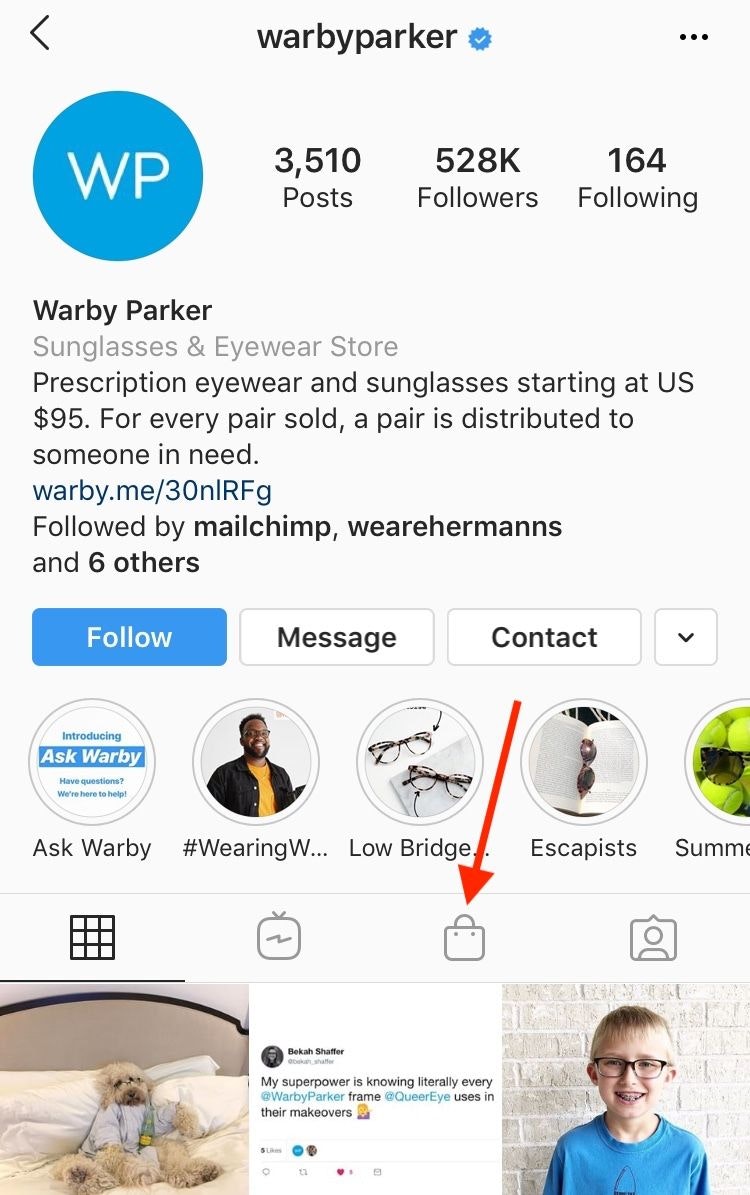
Story ads are excellent for capturing people’s attention, perhaps with a giveaway or a newly released product.
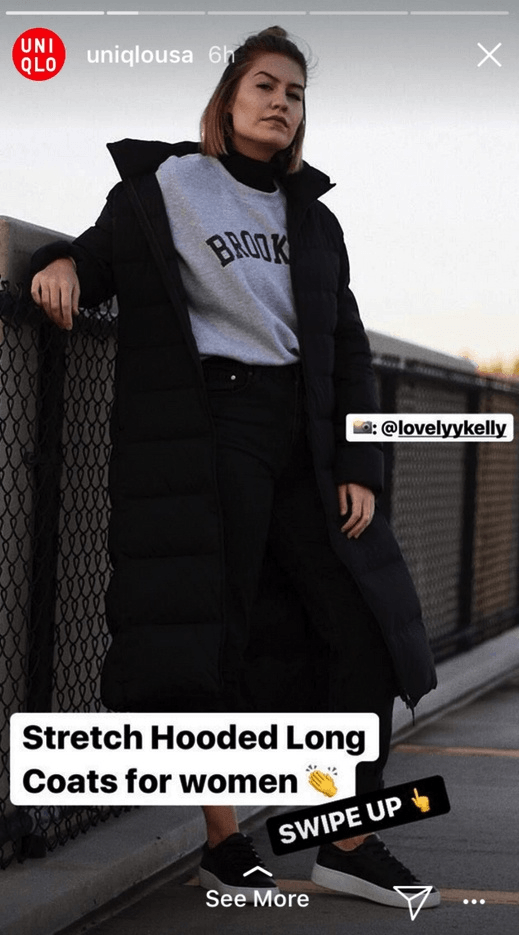
And finally, Instagram ads are best for reaching new audiences and getting the word out about products, events, announcements, and much more.
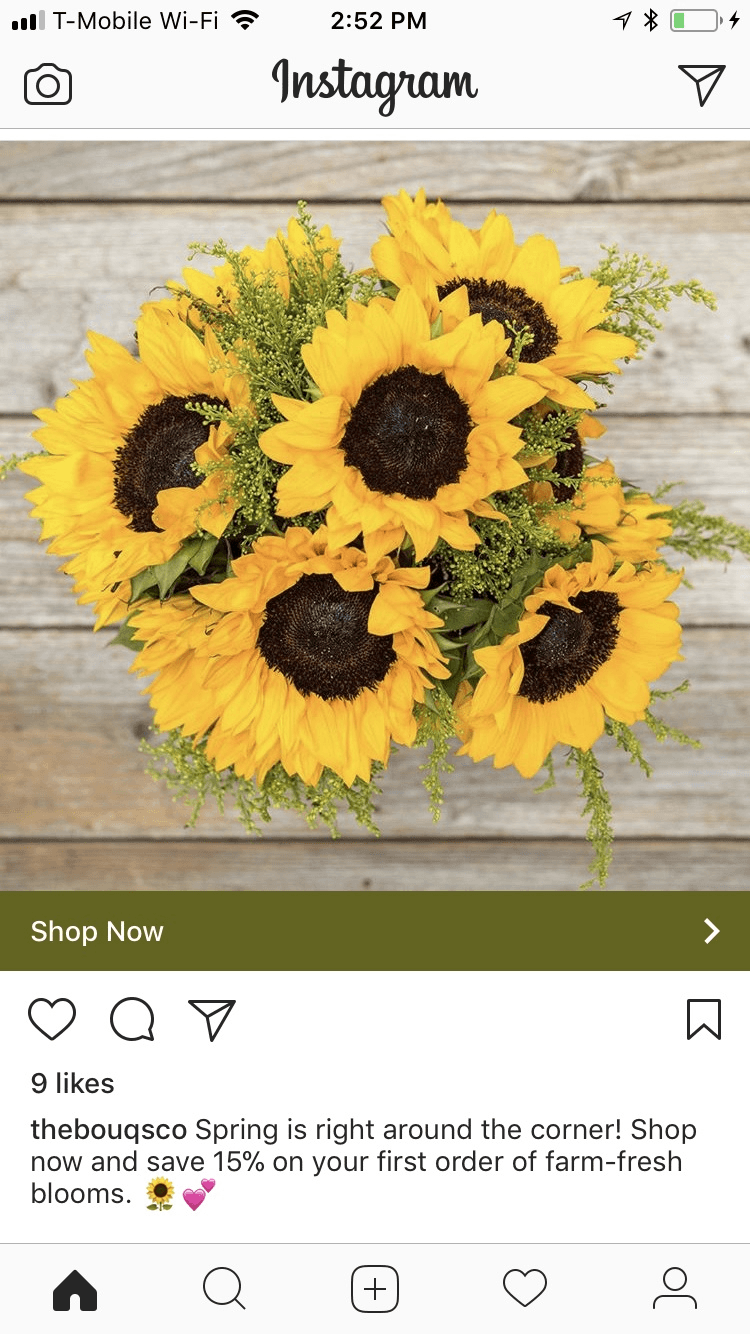
All of these options make it easy for your users to go Instagram shopping and spend a lot of time interacting with your brand.
How to Increase Instagram Followers
Even if you have barely any Instagram followers, don’t worry. There are many ways to organically increase Instagram followers and build an audience of people who are eagerly awaiting new content from you.
You’ll notice that often, if you follow people, they’ll follow you back. (While some brands don’t like to follow tons of accounts, there’s no denying that the approach works.)
But let’s say you’re looking to move beyond the followers you’re already gaining naturally. What do you do?
Interacting with other people’s content is a great method of getting follows. Reposting content (in both posts and Stories) often works like a charm. Many times, people will repost your reposts! People love getting attention from brands, so when you interact with people in this way, it’s very likely to up your follower count.
Check out how Summer Fridays reposts their customers’ content in their Stories:

Of course, you can always use hashtags to gain new followers. Hashtags work really well, but there’s a common myth that they’re not so effective. That’s because most businesses use only a few hashtags that are very general. The trick is to use a lot of niche-specific hashtags (you can use up to 30 per post) so you attract an audience that’s guaranteed to be interested in your page.
As a general rule, it's good to stray away from general hashtags like #business. Instead, you can hit specific hashtags like #hustleandgrind. If you take this approach, you’ll likely see an increase in the number of followers you get.
How to Increase Instagram Engagement
Increasing social media engagement is crucial for every platform, but on Instagram, it’s especially important. Instagram can bring your page a huge amount of engagement, but you have to know how to optimize for it.
According to Instagram themselves, 80% of all Instagram accounts follow a business. People love connecting with brands on social media, and Instagram provides plenty of opportunities to connect.
The first (and most important) step is to make sure that you’re taking the initiative to engage. By interacting on the platform, you increase the chances that other people will see you and visit your page. By engaging with accounts that are relevant to your niche, you can maximize your account’s visibility and get your brand out there.
And of course, you’ll also want to make sure to engage on your own content as well. Favoriting and responding to comments can go a long way, and it can make an amazing first impression on new visitors and followers.
Check out how Califia Farms engages with people in the comment section:
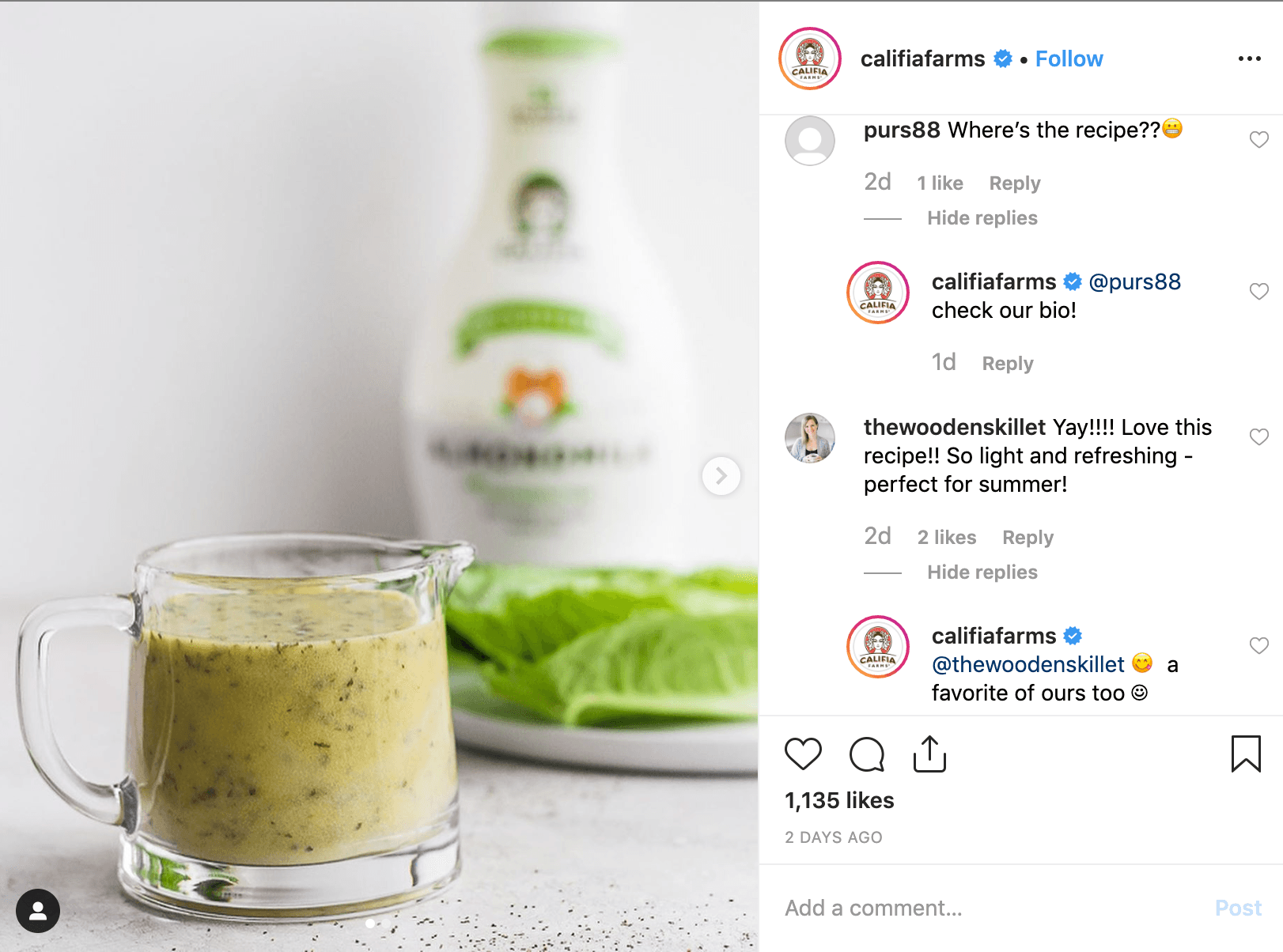
This fosters a friendly, welcoming atmosphere and builds a great connection between brand and user.
This is just one way to interact with content. Reposting (which we looked at earlier) is another excellent strategy.
And of course, take full advantage of Instagram’s built-in features, like live video and story stickers. These stickers give you the ability to ask your followers questions, get their opinions in polls, and even answer quizzes.
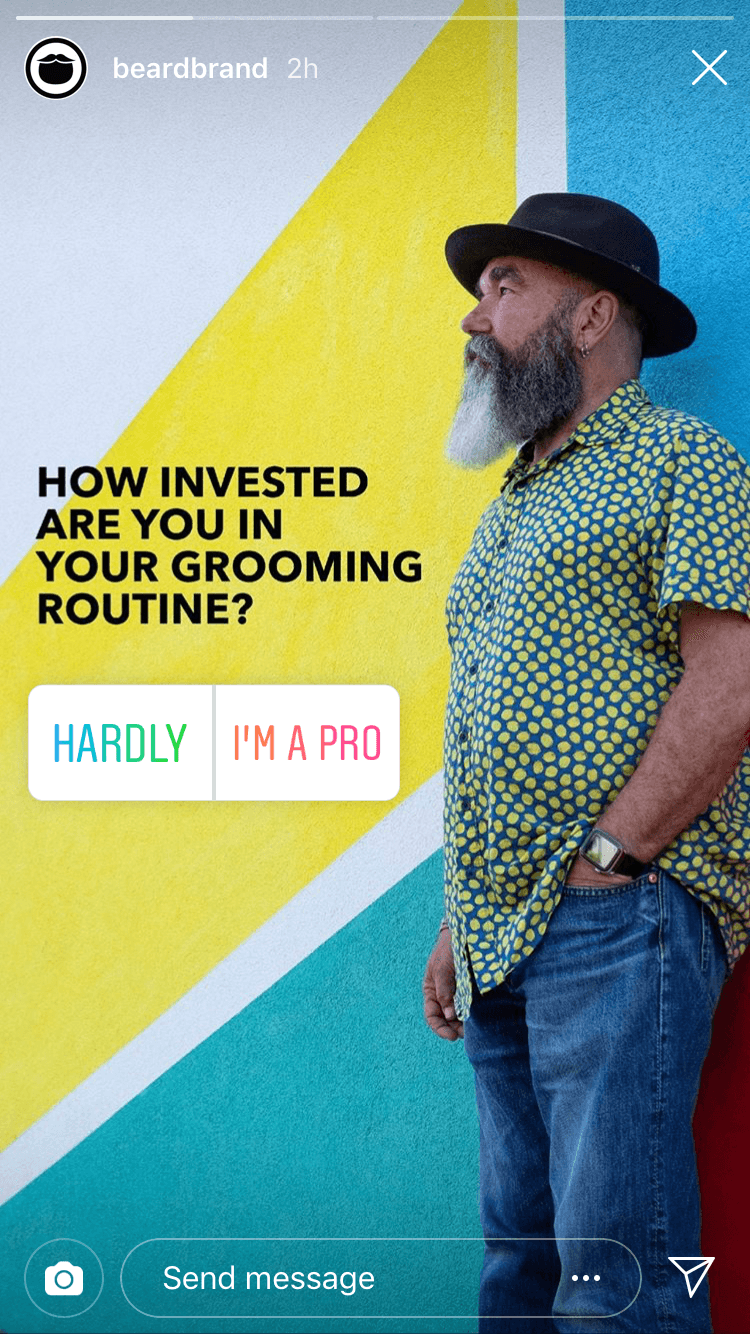
Engaging daily is a must. If possible, interact with the platform multiple times a day. The more you give, the more you’ll get back.
How to Understand Instagram’s Algorithm
Instagram’s algorithm is another social media algorithm that has a lot of mystery surrounding it.
The Instagram algorithm became even more of a hot topic when Instagram stopped using chronological feeds and started using algorithmic feeds. Since Instagram’s algorithm now sometimes dictates how people see content in their feeds, businesses have been rightly concerned about what would change.
In Later’s post about this new algorithmic change, they underscore that while there are some new aspects to the algorithm, it pretty much prioritizes the same things it always has. Consistently frequent posting and engagement are still the backbone of succeeding on Instagram.
There are a couple of things to note, however. First, the more that you engage with people, the more Instagram will associate their accounts with yours. That includes comments, tags, and direct messages.
Second, Instagram’s latest algorithm places an emphasis on timeliness. Confusingly, this plays out differently for various types of users. Frequent users will often see posts in chronological order, while more infrequent users will sometimes have their feed sorted algorithmically instead.
Still, if you can find the best time to post, you’ll usually be able to strike a good balance. In our article about the best time to post on social media channels, we found that lunchtime (11 a.m. to 1 p.m.) and evening (7 p.m. to 9 p.m.) were the best times to post on Instagram.
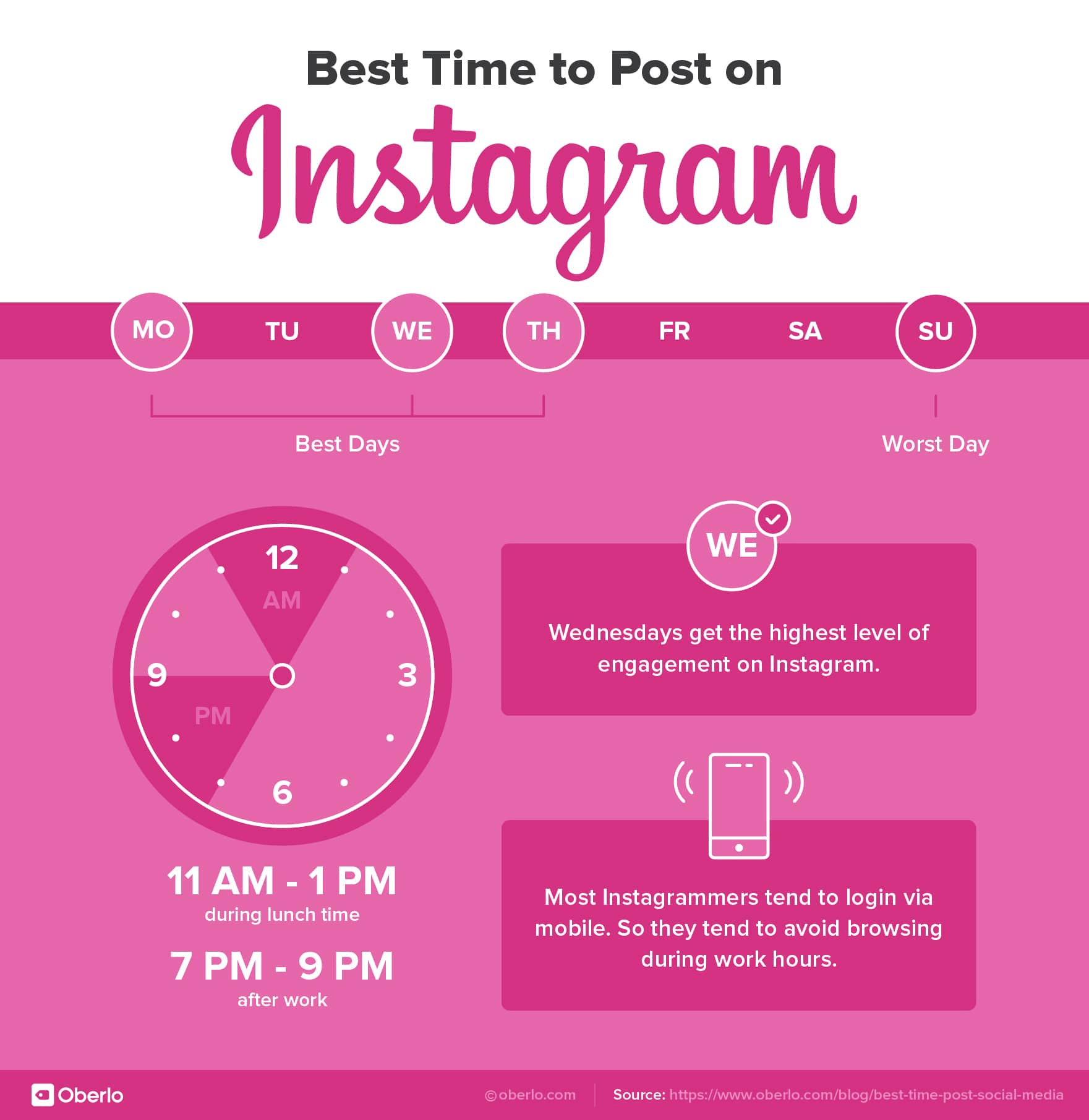
Using Instagram Video
Currently, Instagram supports video that is between 3 and 60 seconds long.
Instagram Stories also support video, but there’s a max of 15 seconds per Story clip. So if your video is longer, it’ll be split up into multiple 15-second fragments.
Additionally, you can use IGTV, which allows videos of up to one hour in length.
Each of these three features is ideal for different types of social media video.
Video posts (that appear in users’ feeds) are great for product demonstrations and special features. Freshly uses video posts to demonstrate how to make their meals and showcase what benefits people will get from using their service.
Story videos tend to be much more casual. Brands will often post GIFs or repost users’ videos as Stories.
IGTV is a unique option that many brands are still exploring. It’s basically Instagram’s version of YouTube, albeit not as full-featured. There are tons of possibilities here since you can have up to an hour of video.
Furniture company West Elm uses IGTV to showcase everything from expert interior design advice to apartment redesigns.
It’s worth experimenting with all three types of Instagram video and monitoring their performance with social media analytics tools.
Using Influencer Marketing on Instagram
Influencer marketing has experienced an absolute boom on Instagram. There are over 500,000 influencers on Instagram out of the platform’s 1 billion users.
Influencers have a huge amount of reach on Instagram thanks to the platform’s algorithm. By pairing up with influencers, you can increase social media engagement across the board and get your brand in front of new audiences.
Finding influencers is straightforward. It’s easy to find influencers in your niche just through searching Instagram and keeping up with relevant people in your industry, but you can also use social media tools like Ninja Outreach to fine-tune your search.
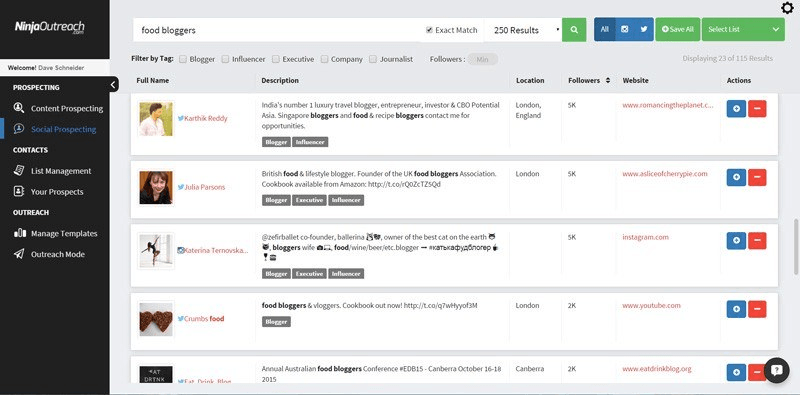
Tools like these will give you additional analytics to work with that will help to illustrate the bigger picture so you know which influencers are the best matches for your brand and goals.
Once you’ve found influencers, reach out to them. Many influencers will usually have a business email in their bio, but if not, simply direct message them.

There are several different ways to do Instagram influencer marketing, from product shoutouts to brand ambassadorships. The approach you should take will depend on the scale of your involvement with influencers and, of course, your social media goals.
Most often, it’s best to start off with a product shoutout or a sponsored post. From there, you can build influencer relationships that may be very beneficial in the long term.
Conclusion: Instagram Marketing
No matter what kind of company you are, it’s worthwhile to try out Instagram for business and see where it takes you. Having a solid Instagram marketing strategy is critical to the success of your overall social media marketing, so don’t overlook this powerful platform.
Using Twitter for Social Media Marketing
Twitter currently has 330 million active users. It’s a much different platform than Facebook or Instagram, which means it has advantages you won’t find on other social media sites.
Since Twitter is based on short, text-based posts, it has a very different culture and atmosphere than other networks. It places a larger emphasis on interactive communication than other platforms do, so to succeed on Twitter, it’s important to engage in conversations.
Of course, you can also run Twitter ads, post videos, and engage in influencer marketing. Let’s dive into the ins and outs of Twitter marketing.
Twitter Ads
According to Twitter’s latest research, the platform boasts a 50% YoY increase in ad engagements. Coupled with a 14% YoY decline in cost per engagement, and you’ve got an enticing platform for social media advertising.
In terms of Twitter ads, you can sponsor Tweets, accounts, and Trends.
Promoted Tweets are the Twitter equivalent of Instagram ads. They look like regular Tweets but have a small “promoted” label to signify their ad status.
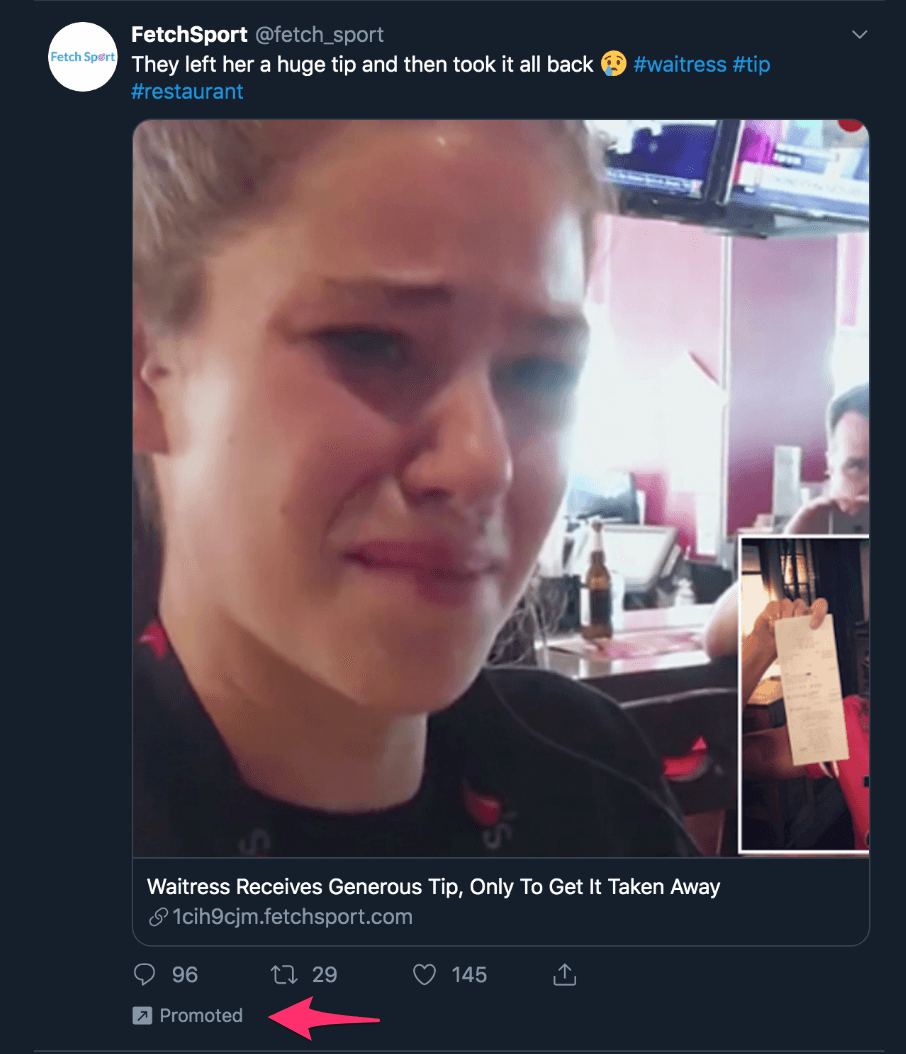
Promoted accounts allow you to advertise your entire account to audiences who aren’t already following you.
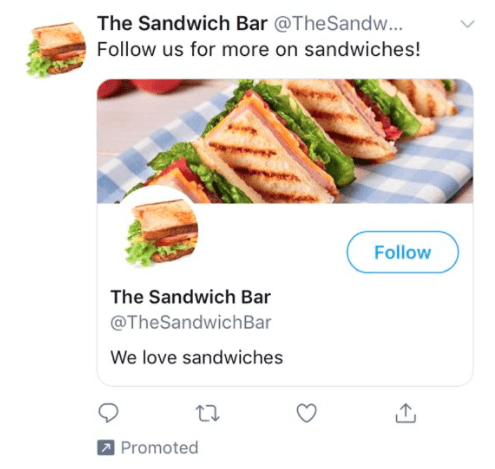
Finally, Promoted Trends let you promote a hashtag in the trending section. When people click on your Trend, they’ll see a promoted Tweet from you at the top of the results list. This is a powerful option for obvious reasons, and it can really pay off.
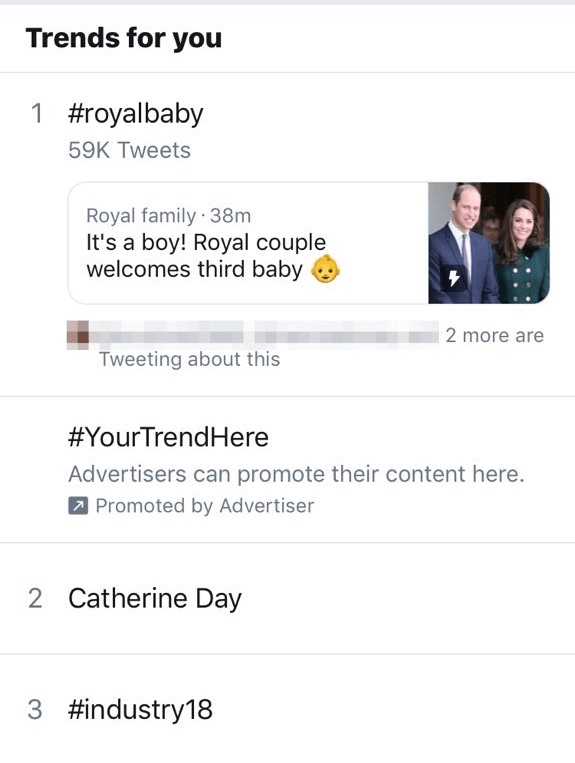
These different kinds of Twitter ads can make using Twitter for business simple, flexible, and beneficial. You can mix and match all three for a well-rounded Twitter marketing mix.
How to Increase Twitter Followers
The process of getting more followers on Twitter is actually looks a lot like the process of increasing your Instagram audience. You’ll want to engage often, use relevant hashtags, and optimize your profile.
Tweeting a lot is vital. CoSchedule recommends tweeting 15 times a day to start with and tweaking your posting schedule from there. At the very minimum, you should be tweeting 3 to 5 times a day. That can include original tweets and retweets.
As with any other social media network, you’ll also want to think about the best time to post on Twitter. We’ve found weekdays during the lunch hour (12 p.m. to 1 p.m.) work best.
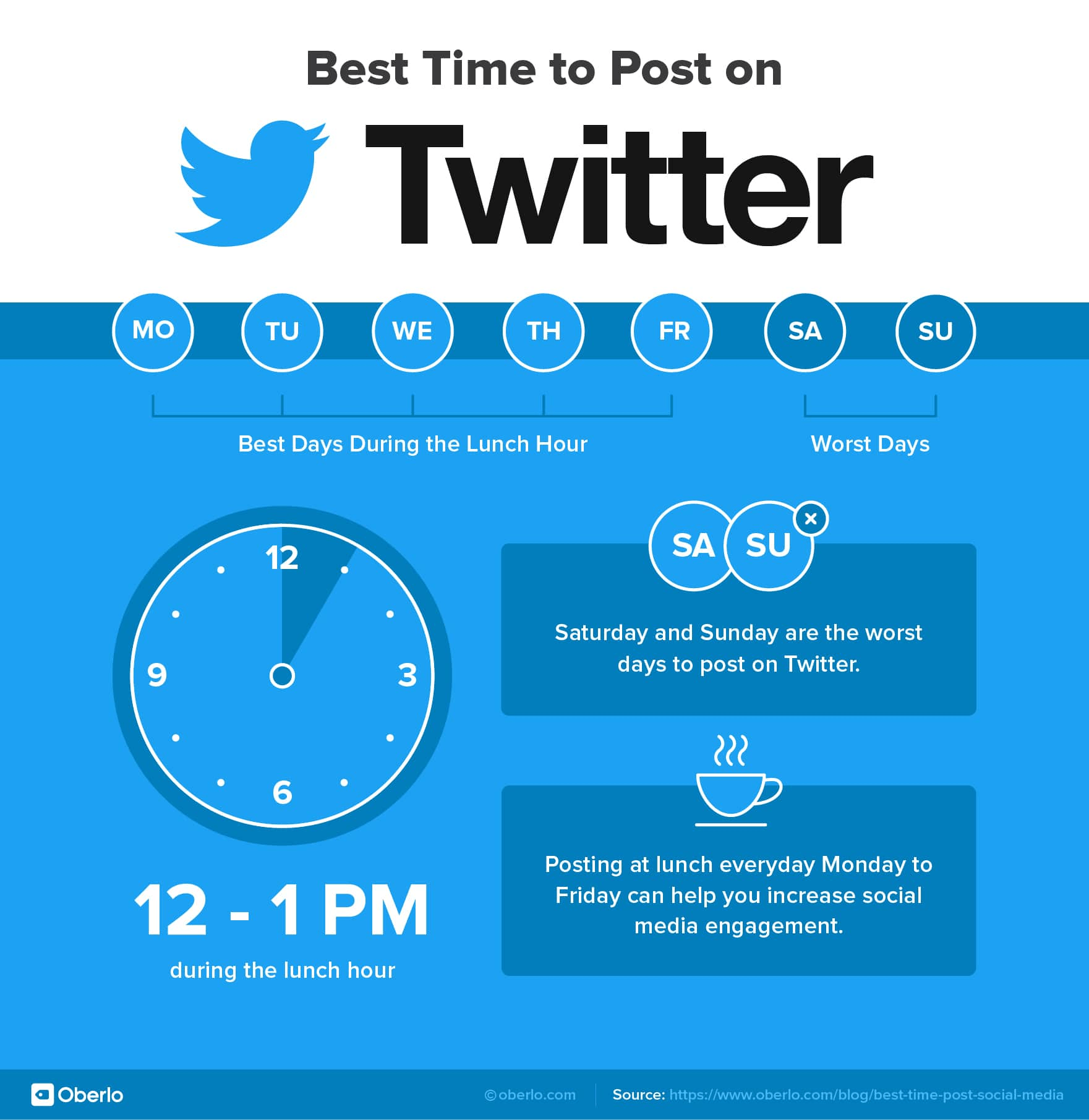
Above all else, interacting with others is the key to growing your Twitter account. Retweet others, post highly visual content, and follow people in your industry. If you’re consistent, you’ll see results.
How to Increase Twitter Engagement
One of the best ways to increase Twitter engagement is to use eye-catching images. Using images can increase the amount of retweets by up to 150%.
Starbucks’s Twitter account is a masterclass in using images on Twitter. Their feed is filled with high-quality, evocative images, and each photo or graphic nicely illustrates its parent Tweet.
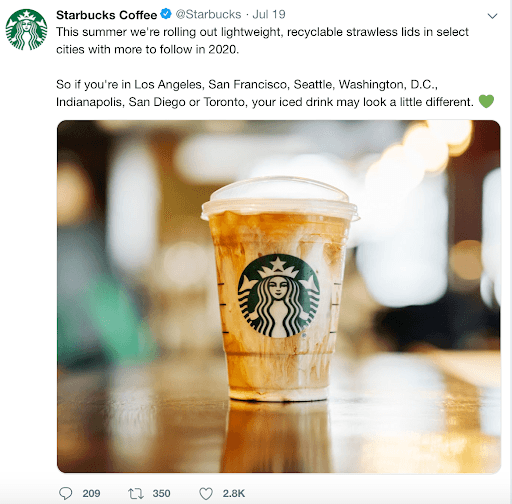
You should also definitely be taking advantage of the Pinned Tweet feature. This allows you to pin a Tweet at the top of your feed, so when people click on your profile, it’s often the first thing they’ll see.
By regularly changing your Pinned Tweet, you can make sure you’re always pushing the latest and most relevant content. Having an attention-grabbing image in your Pinned Tweet is also a great idea.
Finally, keep in mind that Twitter often spurs conversations. Just as you’d respond to comments on Instagram to keep the conversation going, respond to tweets where you’re mentioned as well as replies on your own tweets. This not only boosts your organic engagement but also fosters relationships with your followers.
Understanding Twitter’s Algorithm
Twitter’s algorithm is similar to Instagram’s in that in rewards constant engagement. It also prioritizes how recent a tweet is, so paying attention to those best posting times is going to come in handy.
In December 2018, Twitter announced that users would be able to choose how their timeline is sorted by toggling between Top Tweets and Latest Tweets.
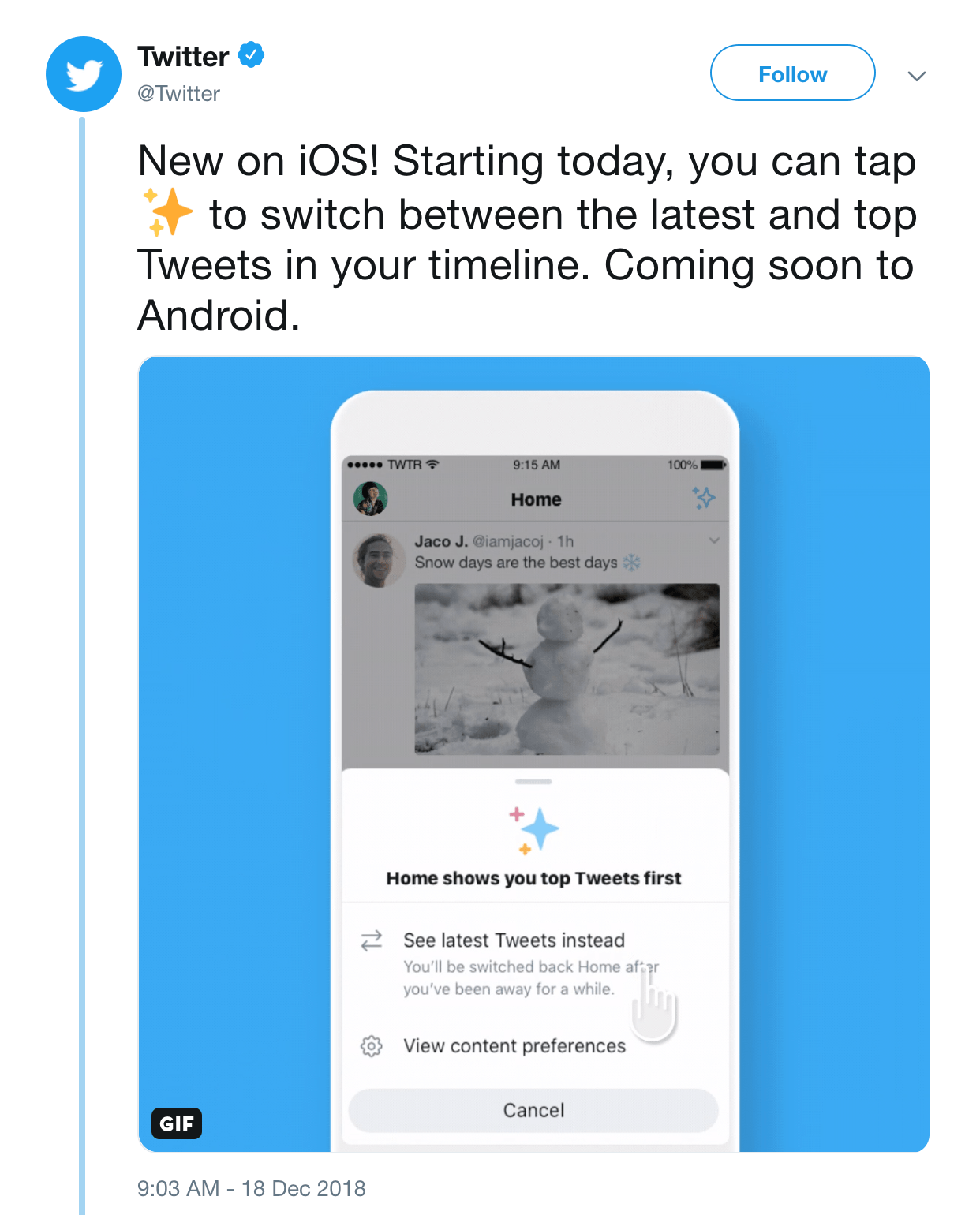
What this means is that users can switch between an algorithmic feed and a chronological feed.
So what can you do about this? Post often so you have many recent Tweets for the chronological feed, and create engaging content so you optimize for the algorithmic feed. This will take some experimentation, so don’t be afraid to change things up.
Using Video on Twitter
Twitter is an interesting platform for video because it’s not video-focused in the way that YouTube or even Instagram is. However, Twitter users still love to see some great video.
According to insights shared on the Twitter business blog, the best videos are short and mobile-friendly.
You can also advertise your videos in three ways:
Promoted Videos let you promote videos you’ve shared on your Twitter.
Video Website Cards are video ads with calls-to-action at the end so people can go right to your website.
In-Stream Video Ads are video advertisements played at the beginning of a video from a Twitter content partner. In other words, your ads can be pre-roll or mid-roll ads within other videos.
While Promoted Videos are the simplest, it’s worth trying all three and seeing what kind of results you get from each method.
Conclusion: Twitter Marketing
Twitter is still a huge social network that you absolutely need to be active on. Between its flexible ad capabilities and engaged audience, Twitter can still help you reach your social media marketing goals.
Using Pinterest for Social Media Marketing
Pinterest has a devoted audience of 300 million users. While it doesn’t have as many users as Facebook or Instagram, it’s still an important social network that can bring you some excellent results.
Pinterest Ads
When we’re talking about using Pinterest for business, the focal point is almost always Pinterest Ads.
There are several types of Pinterest Ads. Promoted Pins are the standard ad format, and they’re what Pinterest marketers usually start out with. These are posts that appear in the user’s feed, and as with Instagram and Twitter, they look like typical Pins except for the “promoted by” text.
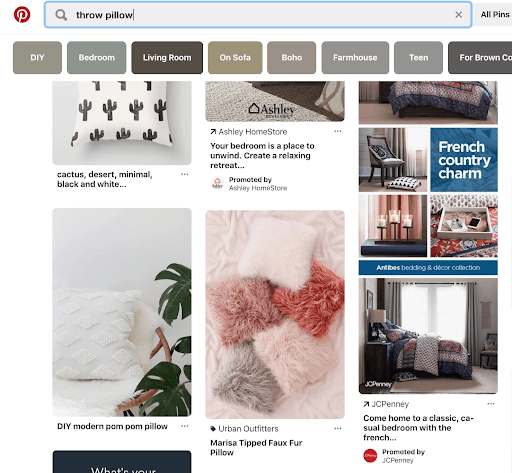
Similarly, you can also create a Promoted Carousel, which allows you to feature several images instead of just one.
Since Pinterest is especially a visual platform (much like Instagram), having exciting, appealing images is critical to the success of your ads. The more you can do to make your ad pop, the better.
How to Increase Pinterest Followers and Engagement
To get more followers and engagement on Pinterest, it’s important to understand that the user base of Pinterest is very different from most social networks. Whereas most social media sites attract young people from all walks of life, Pinterest users tend to be specifically women. In fact, the site reaches 83% of all women aged 25-54 in the US.
Again, the key here is to be highly visual. Pinterest has a certain aesthetic to it, typically characterized by clean, bright images. If you can fit that description while standing out in your own way, you’ll quickly gain Pinterest followers who will actively engage with your Pins.
And make sure you use relevant keywords and hashtags. You can think of this as Pinterest SEO since Pinterest is more or less a search engine crossed with a social media network. Optimize your text descriptions as if you were writing with Google in mind.
Understanding Pinterest’s Algorithm
Pinterest is a huge site with different types of feeds, so understanding its algorithm is important if you want to stand out.
Pinterest sorts its content into two feeds: the Smart Feed and the Following Feed.
The Following Feed consists only accounts that a user is following and advertisements, while
The Smart Feed is algorithmically generated and consists of both organic Pins and advertisements.The Smart Feed is especially dependent on recent activity. If users search for a specific niche, they’ll see Pins from that niche in their Smart Feed.
You can take advantage of this by tagging your Pins with the best keywords and hashtags so you draw in the most targeted audience possible (knowing that Pinterest will actually help you with targeting).
The idea of Pinterest SEO also comes into play here again. Just like Google, Pinterest relies on keywords and suggested keywords to sort its content. If your Pins are thematically linked by keywords and hashtags, it’s likely that users will see several Pins from your account.
Conclusion: Pinterest
Pinterest draws in a specific demographic, so by using it, you’re virtually guaranteed to reach and engage that demographic. Think of Pinterest as another piece to the social media marketing puzzle.
Other Social Media Networks
There are a lot of other social media networks out there to consider. Brands are using every platform from TikTok to Snapchat for business.
Almost any social network can be successful, but smaller social networks are almost always anchored in a specific niche. For instance, TikTok is focused on short, quirky user-created videos, so it doesn’t always lend itself to social media marketing. But a few brands have gotten creative with the platform and found some success with it.
The bottom line: If you’re going to pursue social media marketing on a more niche site, make sure that niche completely aligns with your brand. You don’t want to seem like a fish out of water.
How to Create a Social Media Marketing Plan
Now that you have an idea of which sites are right for you, let’s look at how to create a social media marketing plan.
There are three key elements to creating a successful plan: understanding trends, building a social media calendar, tracking campaigns, and auditing your approach.
Understanding Social Media Trends
Social media trends seem to change by the day. To master social media marketing, you have to constantly keep a finger on the pulse of the social landscape.
That means participating in active social media listening. Using social media tools like Feedly and browsing each social network you’re active on will provide you with insights into what’s trending. The good news is that if something blows up, it usually blows up big time, so you likely won’t miss the huge trends.
Understanding the social culture behind your industry is also crucial. What is your audience interested in, and how does that translate to the social sphere? You might notice commonly used hashtags or phrases that offer insight on the latest trends.
Social media monitoring and listening are absolute necessities. Don’t consider them afterthoughts; instead, make them part of your social media approach.
Building a Social Media Calendar
A social media content calendar will be your best friend when it comes to creating and posting engaging content. Once you have a solid brand voice and goals, you can build a content calendar that dictates what and when you post.
First, you need guidelines. How will you structure your posts? How frequently will you post? How will your posts help you achieve your goals?
You need to ask yourself important questions like these in order to make a winning content calendar. Check out our social media calendar template if you need some inspiration.
By planning posts ahead of time and automating the posting, your social media strategy will become a whole lot easier. Tools like Buffer, CoSchedule, and MeetEdgar can help you accomplish this.
Tracking and Measuring Your Social Media Campaigns
Your social media marketing goals are unique to your brand, so it’s important to closely track your performance.
Using social media reporting tools like Google Analytics and Social Report, you can follow your social media metrics and compare yourself to industry benchmarks. Don’t forget about on-platform social media analytics tools; the built-in analytics are actually the best places to start tracking.
Aside from metrics, monitoring your social media ROI and social media advertising costs is also key to understanding exactly how effective your campaigns are.
Conduct Regular Social Media Audits
What good is a social media marketing strategy if you never revise it? This is where the social media audit comes in.
The term “audit” might sound intimidating, but it’s really just a holistic look at how your brand is performing on social media. You’ll look at not only metrics and analytics but also engagement and popularity. And, of course, you’ll check to see if you’re really accomplishing your social media marketing goals.
Here are some questions you may want to answer with your audit:
- How is my brand performing across all social media platforms? (Think KPIs, performance metrics, engagement, etc.)
- Are all of my social media accounts on-brand?
- Who am I advertising to on each social media site?
- Which channels are effective, and which ones are ineffective?
- Which posts have performed the best, and why did they perform so well?
There are plenty of social media audit templates that you can use to build a customized auditing plan for your brand. It’s not as difficult as it seems, but it is important. Don’t overlook this critical step when creating your social media plan.



Conclusion
Social media marketing is one of the most important forms of marketing you can do today, and many experts argue that it’s the single most important one. There are so many social media advantages that you won’t get from other forms of marketing. You can get direct access to your target audience and engage with them on a daily basis.
If you’re not already taking advantage of everything social media marketing has to offer, we hope this guide pushes you to take the first step! And if you’re already doing social media marketing, use this guide to refine your approach and ultimately accomplish your goals.
